‘Decarnation’ review: Indie pixel horror takes centre stage
If you’re a fan of pixel horror or emotionally-invested stories, recently released French indie game Decarnation must be added to your wishlist (or put straight into that basket!). Released back in May and available through Steam or on the Nintendo Switch, the story puts you in the shoes of cabaret dancer Gloria, just before her life takes a nightmarish turn: she’s kidnapped.
(Slight spoilers ahead, but not much beyond what can be gleaned from the release trailer.)
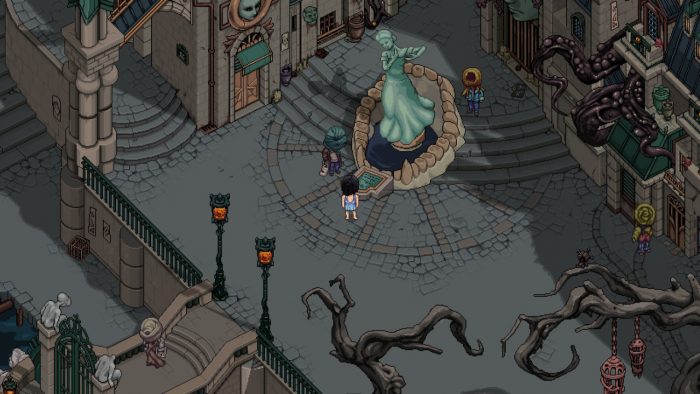
A nightmarish version of Paris, where, in some impressive pixel animation, this lovely statue spins endlessly around and around…
Just from the main menu of the game I can see that the pixel art for Decarnation is gorgeous, which in turn has me worrying about what terrifying and grotesque visuals the artists are capable of creating. I made sure (as much as it unnerved me), to only load up the game once it had gotten dark, for the full horror experience. Once you hit ‘Play’, the first image the game shows you is the female body, alone, surrounded by darkness. Gloria is stood in a pose, hand on hip. A tap drips at a sink. Then Petrus, a man with shadowed eyes, appears opposite her, before the rest of the room fades into view – a workshop. Petrus is working on a statue of Gloria. Like establishing shots in a film, the game presents through the reveal of its visuals the themes of objectivity and the male gaze that it attempts to tackle. Get used to the visual motif of one person looking down upon another – whether like this, positioned to be looked at, or as Gloria stands onstage, the inescapable feeling of our protagonist being watched is more than effective for a horror game. You’ll also immediately meet with issues of every day sexism and body image, when Petrus describes how ugly an older woman who had previously posed for him is now, because of her age. My jaw is set against the notion, and straight away I am invested in where the story is about to go.
When coming across the opportunity to review this game, all I knew about it was from when I had checked out the trailer. It’s certainly apt that, for a game that deals with the aforementioned themes, there are comments by one user under the trailer about how they wanted more nudity, which appears as briefly seeing Gloria posing and then in the completed statue. Initially, the comments discuss wider anti-nudity policies in games, and that one’s body does not need to be seen as something sexual, as it is entirely natural. This is a sentiment I certainly agree with, in particular relation to female bodies. Yet the comments also discuss how they wanted to see Gloria when she showers at the beginning of the game (a very short moment where she goes behind a door and you perform some button inputs to use a towel to dry off), or when she dances at the cabaret. It’s true that the line between tasteful and tasteless can sometimes be tricky to consider as a consumer of media. I’m reminded of when I learned about how Laura Mulvey applied the theory of the male gaze to cinema, theorising that everyone unconsciously takes on an objectifying worldview as they watch media. On one hand, naturalising the idea of viewing other bodies without a sexual lens is a very worthy notion. But on the other, when the commenter describes what they would have liked to have seen, how “topless nudity would have been enough”, and makes reference to how other pixel art games have nude mods made by players, I can’t help but be left with a bit of a sour taste. On the reviews section of the Steam product page, user Tony Hawk’s Moving Castle (fantastic username) describes Decarnation as “like Heavy Rain if that game had artistic integrity”, which, if you are unfamiliar, has examples of gratuitous nudity and the male gaze throughout. But David Cage’s games, including his treatment of Elliot Page’s body in another of his titles, could be a whole other article. Though a darkly funny observation, it’s a pretty effective summary. Honestly, if you’ve played a horror game that deals with every day sexism and the objectification of women, and are mostly left wishing you could see more nudity, then maybe we didn’t play the same game.
The game utilises its creepy and grotesque visuals to match the story well and create a very tangible world of Gloria’s nightmares
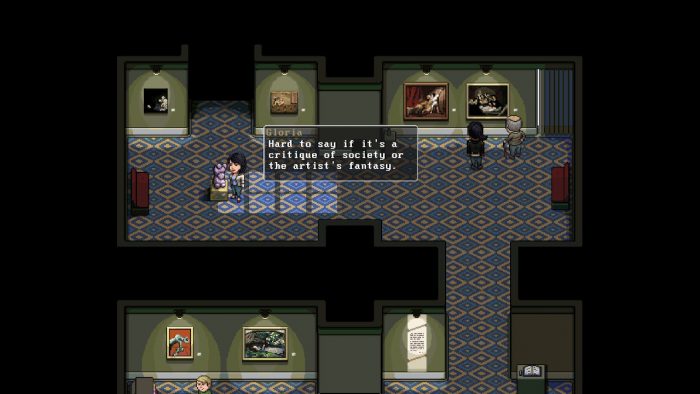
Gloria visits an art gallery at the beginning of the game, and has similar commentary for each piece if you interact with them.
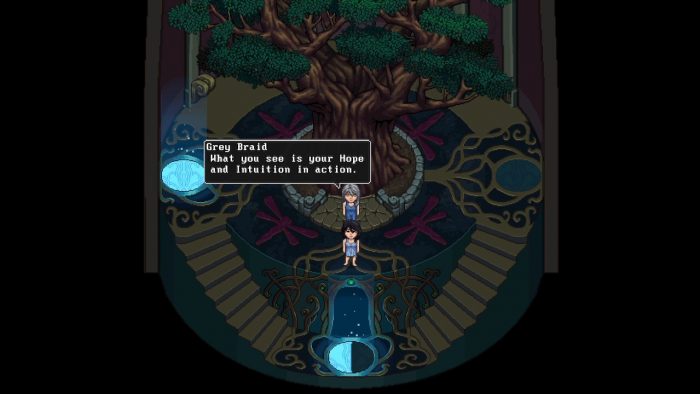
Getting some advice later on in the game.
Despite all this, I noticed early on in the game that some of the dialogue would strike me as a little on the nose, such as in the screenshots to the left. I can’t say that this didn’t happen often, and I’m not sure if it was just how it was written, or down to the French-based developers needing to translate the text and perhaps losing some of its subtlety or nuance. But there’s only so much that you can say a work is heavy-handed before you won’t let it say anything at all, and with such topics as aforementioned at the helm, it might be worth going for a more direct approach. Nevertheless, the strong focus on the themes that I believed the story was initially dealing with develops into a conversation that also involves stalking, mental health problems, and empowerment. By no means is this an entirely bad thing, as the game utilises its creepy and grotesque visuals to match the story well and create a very tangible world of Gloria’s nightmares. However, I would say that along this journey I found the many themes it attempts to contain got a little confused or lost, making for a bit of a stagnant middle section where I wasn’t overly engaged. Yet, these developments take place well into her kidnapping as we witness the breakdown of Gloria’s mental health, so it can even be argued that a little tediousness just goes to reflect the character’s arc. In a game comprised of six acts that took me approximately an hour apiece, I’m honestly nit-picking.
But most memorable are the [scenes] of nightmares, featuring a hauntingly distorted and at times hideous version of reality, as an apt reflection of Gloria’s mind

Gloria’s mind wanders as she takes a swim.
The first act of Decarnation kicks off the game great, drawing you in and telling you all that you need to know before ramping up both the scares and the stakes. Other reviews have compared a lot of its gameplay to a visual novel with small interactive moments. This is pretty much true, but I didn’t mind that. If you know that’s the kind of game you’re in for, you can’t be disappointed – Decarnation performs quite comfortably within its genres. Near the beginning, a scene depicts Gloria taking a swim in a pool as she imagines her girlfriend floating alongside her, harshly voicing Gloria’s insecurities aloud. As the player, you’re invited to repeatedly press to drown this cruel voice under the water and keep swimming
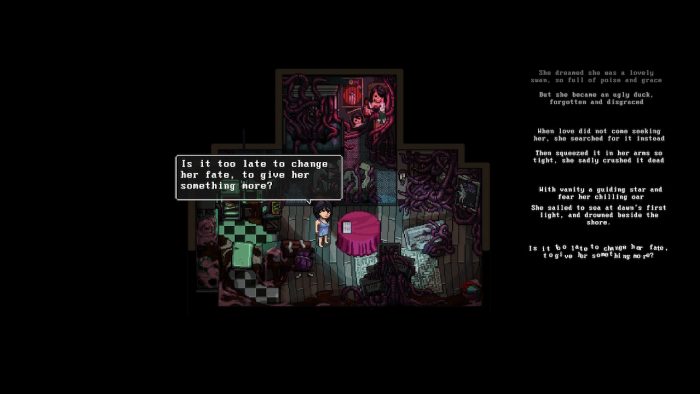
One of the sequenced riddles of the game, where you move around the room to find the different lines in the correct order.
along. It’s a short sequence with a simple element of gameplay, but I appreciated its unique way of giving us insight into the character’s thoughts rather than simply reading some dialogue, as well as showing off more of the impressive pixel art. Admittedly some of the gameplay in the rest of the title is more hit and miss, such as rhythm games that are a little clunky and hard to follow, or repetitively hiding from monsters as you wait for them to pass, but there’s plenty that breaks up the visual novel elements. You’ll find yourself screaming at monsters to destroy them, solving riddles or other puzzle sequences, facing bosses, and performing other simple interactions, like in the pool, that create effective moments.
It wouldn’t be right to review Decarnation without mentioning a bit more about the graphics than I already have. Though some may view pixel art as simplistic, a look at the various scenes of the game would certainly show otherwise. The style serves the horror genre supremely well, like many other indie titles before it, and there are a lot of creepy and gruesome visuals that had me recoiling in a disgusted sort of awe. Overall, the atmosphere is well-crafted to suit each scene – which oftentimes is rather grim and sinister to match the story’s tone. But most memorable are the ones of nightmares, featuring a hauntingly distorted and at times hideous version of reality, as an apt reflection of Gloria’s mind. Of course, atmosphere is not merely visual. Across all of Decarnation is a great soundtrack, from “Gloria’s favourite songs” by pop group Fleur et Bleue (that I’ve even listened to outside the game) to general creeping ambience that keeps you on your toes, ready for what horrors you might see next.
So, if you’re looking for your next hair-raising title, make sure to consider Decarnation. It’s not without its small flaws, but it’s a great indie experience that’s worth checking out – and if you do happen to do that, then at the very least we can share a new aversion to chocolate sauce. (If the rest of the review didn’t intrigue you, I hope that did.)
A code for Decarnation on Nintendo Switch was provided by the publisher in exchange for an honest review.
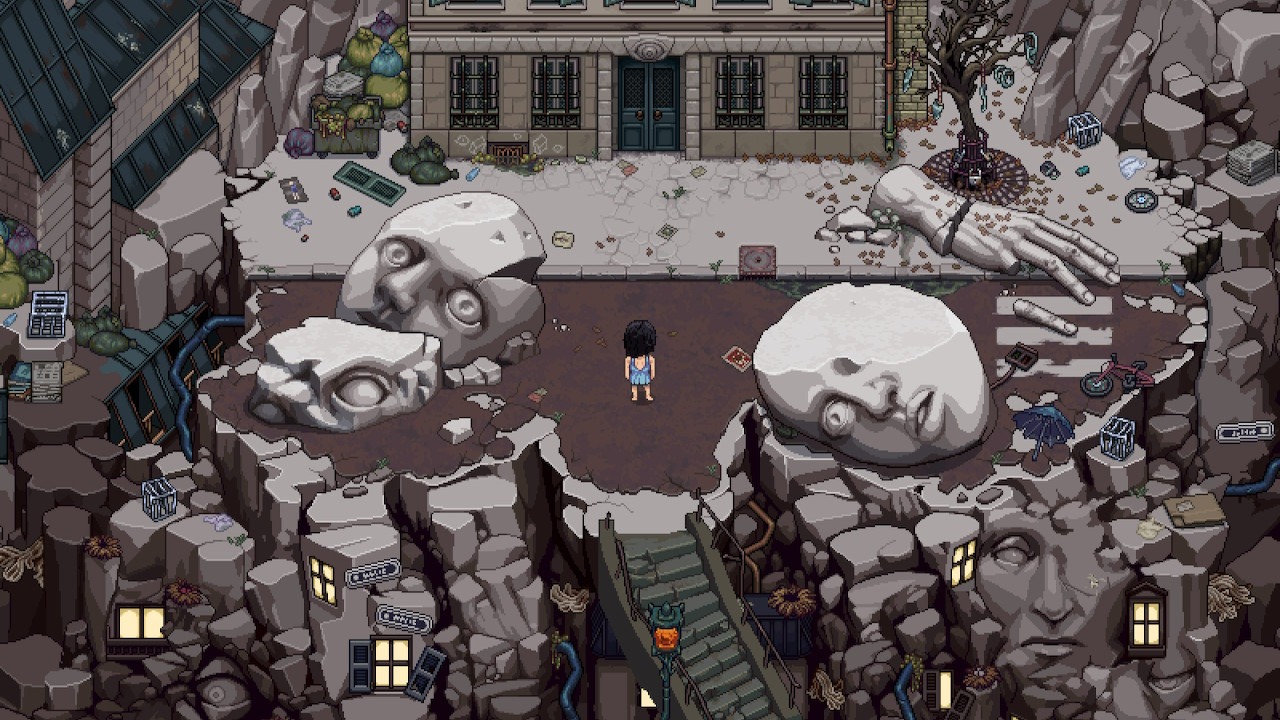
Comments